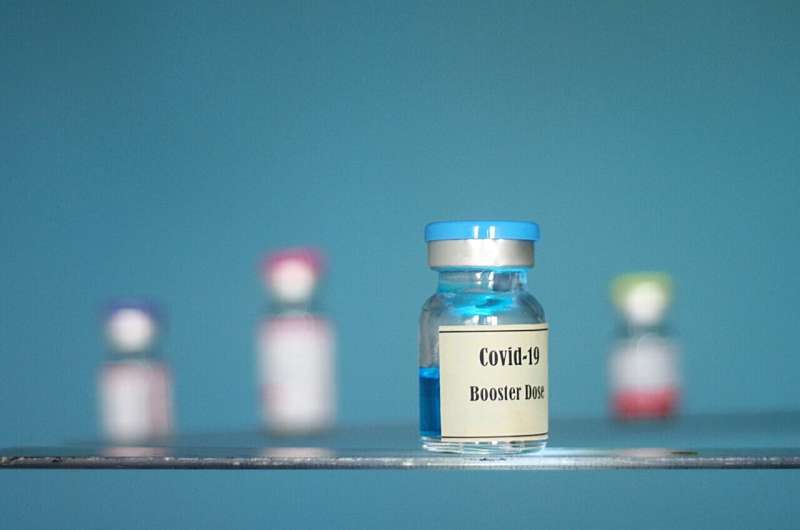
The COVID-19 booster shot campaign is moving at a faster clip than the original vaccination push, according to a new U.S. study. That’s the good news. The bad news is the pace may not be quick enough to ward off an onslaught of omicron infections over the winter.
“We can’t get boosted fast enough,” says David Lazer, university distinguished professor of political science and computer sciences at Northeastern. He predicts more outbreaks such as the one that recently hit Cornell University as a flashing warning sign for the rest of the country.
Cornell “went from 40 or 50 students being positive every day to several hundred students testing positive, and suddenly everything shut down,” Lazer says. “And that was literally overnight. We can anticipate that we will have an enormous peak of cases over the next two months.”
With the U.S. having recently crossed 800,000 COVID-19-related deaths, it is very likely that the one-million mark will be reached in the spring of 2022. “That would be my best guess,” says Lazer.
To get an early read on booster recipients, the COVID States Project, a collaborative effort by researchers from Northeastern, Harvard, Northwestern and Rutgers, polled nearly 23,000 people nationally, 71 percent of whom had received at least one vaccine dose. Of that total, 30 percent—mostly people 65 and older—reported getting a booster.
“That makes sense since older people were prioritized,” says Lazer. “They were also the first to get approved for the original vaccines.”
Boosters have been allowed for certain groups since late November, or a few weeks after the COVID States Project study launched—”a period where booster shots were going up quickly,” Lazer adds.
While an early snapshot in time, it offers researchers valuable clues as to who has received the extra doses so far, who plans to get them, and who remains reluctant.
Men are more likely than women to report having received a booster (32 percent vs. 27 percent). Percentages also increase dramatically as respondents’ ages, incomes, and education levels increase. A person with a graduate degree is more than twice as likely to have had a booster than someone with a high school diploma, the study found.
“People who have more resources are better equipped to navigate the system to get their boosters faster, so there’s a disparity,” says Krissy Lunz Trujillo, a postdoctoral researcher in Northeastern’s Network Science Institute who worked on the survey.
That was also the case nearly a year ago in the early stages of the vaccination campaign, when education and income were enormously indicative of those getting immunized.
“Almost everyone at the very front of the line was affluent and well educated,” Lazer says.
Politically, Democrats slightly outpaced Republicans 33 percent-29 percent among booster recipients. But one noteworthy difference between boosters and vaccines is the absence of a clear red-blue divide. Prior Northeastern research reports consistently found much higher numbers of Democrats than Republicans supporting vaccinations.
But “we see a much less stark partisan divide on booster shots,” researchers noted in the study, most likely because they are looking only at the booster rates for already-vaccinated people.
The highly transmissible omicron variant is having an impact on boosters. Researchers found that the probability of an extra dose increased by more than 3 percentage points after it was designated a “variant of concern” in late November by the World Health Organization and the United States.
However, not everyone is on board with boosters. Nearly half of respondents (47 percent) who were previously vaccinated were hesitant or outright resistant to another dose. These are probably people who reluctantly got vaccinated in order to keep a job, say researchers, speculating that dwindling faith in vaccines may explain their skittishness.
“People may be waning in their confidence in the vaccines,” suggests Trujillo. “They’re wondering, “If I have to keep getting these boosters, are the vaccines really working?'”
Anthony Fauci, President Joe Biden’s pandemic medical adviser, says that a booster shot greatly increases protection against severe illness from an omicron infection. “We are going to see breakthrough infection, there is no doubt about that,” he said on NBC’s “Meet the Press.”
The variant already has upended Broadway shows, professional sports leagues, and other large gatherings. The dropping of the ball on New Year’s Eve in Times Square is even in question.
In the next few weeks, colleges and universities likely will require booster shots before the spring semester kicks off in January, predicts Alauna Safarpour, who also is a postdoctoral researcher in Northeastern’s Network Science Institute.
“It’s just untenable for universities to continue to keep their doors open with the kind of spread that we’re already starting to see,” she says.
Source: Read Full Article



